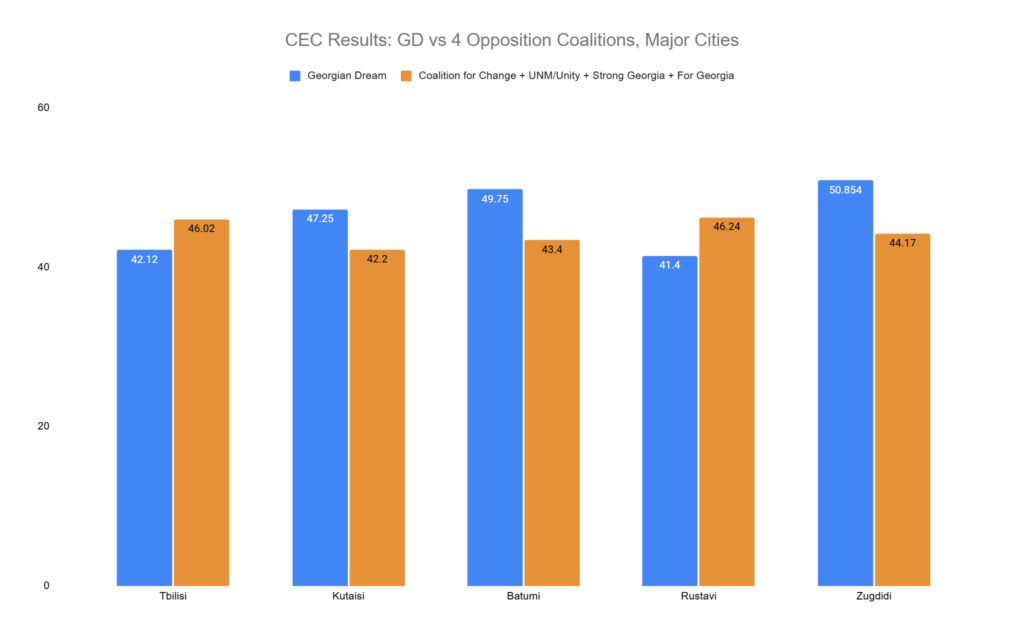The Central Election Commission has published official results showing that the ruling Georgian Dream Party won the parliamentary elections in the country with 53.92%, while the four coalitions of opposition parties who passed the threshold for voting totaled 37.78%.
The vote on October 26 was the culmination of months of anti-Western and anti-democratic drift by Georgian Dream. The official results came as a surprise to many pro-opposition supporters who expected GD would lose support. Georgian Dream used fearmongering, homophobia and threats to return the United National Movement as part of its campaign.
About 90% of precincts conduct their polling electronically. This means that they use electronic technology to verify voters and count votes.
Local and international observers have noted a climate of fear and intimidation in the run-up to the election, including the passage of the Foreign Agents Law. They also cite reports of vote-buying and violations to voter privacy. Local and international observers have noted a climate of fear and intimidation in the run-up to the election, including the passage the Foreign Agents Law. They also note reports of vote buying, violations of voter privacy and physical altercations.
By 8 p.m., the voter turnout was 59%. This is three percent higher than previous elections but slightly lower than 2012’s historic race that brought Georgian Dream into power. The opposition had expected a higher voter turnout in their favor, but the official results revealed a completely different picture.
Trends in CEC Official data
Georgian Dream, according to official data won in most regions in Georgia but lost in major cities or was close to losing.
GD’s strongest lead was in the southern regions Samtkhe-Javakheti (87% in Ninotsminda, Akhalkalaki and Kvemo Kartli) and Kvemo Kartli (67% to 82% in many districts). These are remote constituencies with ethnic minorities that have traditionally been strongholds for Georgia’s ruling party. The GD did not win in Rustavi (Kvemo Kartli), a central city about 20 km outside of Tbilisi where it received 41.4% votes.
The CEC results also show that the ruling party has won with confidence in the mountainous regions Svaneti and Racha-Lechkhumi, as well as Guria & Adjara (more than 60% support).
Georgian Dream lost the capital of Georgia to the opposition after receiving 42% of the votes against 46% of the four opposition alliances plus 5,3% of the libertarian Girchi.
CEC data shows close races in other major cities such as Kutaisi, Poti, and Batumi. Georgian Dream did not win any of these cities but still received more votes than four pro-Western coalitions. GD won 48% of the vote in Tsalenjikha, which was run by the opposition. This is more than four opposition coalitions combined.
Three years after losing some of its municipal councils in 2021, the ruling party has won the remaining districts of Samegrelo. Georgian Dream, however, lost to the opposition in overseas districts where it received only 15% of emigrant votes.
2020 vs 2024 Vote
Georgian Dream, according to official data, received 1,118,836 votes in real terms, which is about 191,000 more than the previous parliamentary elections of 2020. The Unity – to Save Georgia coalition, led by the United National Movement (the former ruling party), received 210.895 votes (10.16%), less than half of what UNM received in 2020 when it received 523.127 votes. This is partially explained by the fact that the party ceded its leadership and some of its voters to a new coalition, the Coalition for Change. The Coalition for Change received 229,006 (11,04%) votes. The combined total of the UNM led alliance and the Coalition for Change, however, is still 83.226 votes below UNM’s result for 2020.
Strong Georgia, led by Lelo For Georgia, was able to achieve better results than Lelo 2020, gaining 182,891 (8.81%), presumably because several smaller forces were included in the coalition. For Georgia, led by the former Prime Minister Giorgi Gakharia has never participated in a parliamentary election. The party received 161,250 (7.77%) votes.
The official results show that the Georgian Dream has a slightly lower share than the exit polls for Gorbi commissioned by the pro-government Imedi TV. However, the official results are in stark contrast to exit polls conducted either by HarrisX (for the pro-opposition Mtavari Arkhi), or Edison Research (for the opposition-leaning Formula-TV), the latter of which is known to be the most accurate pollsters on election day. Both HarrisX, and Edison Research, had projected the opposition to win.
Follow our Election Blog to get live updates.
Read More @ civil.ge













